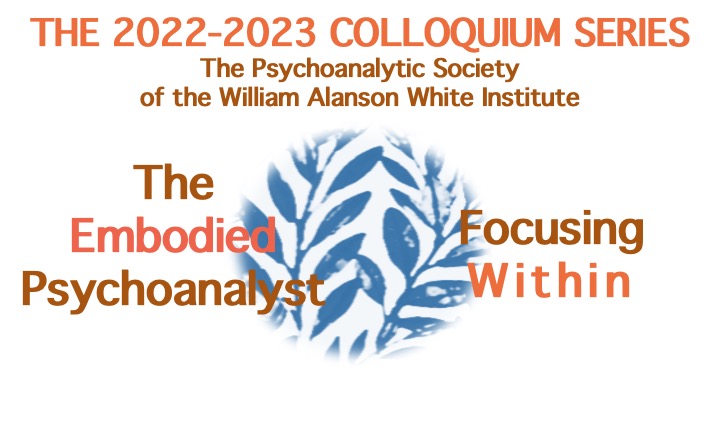White Institute Calendar
Colloquium 2022-2023 series
 HENRY MARKMAN, MD
HENRY MARKMAN, MD
The Analyst's Embodied Presence,
Attunement and Accompaniment
Discussant MIRI ABRAMIS, PhD
Friday, October 14th from 8:00-9:30PM
All of this year's Colloquium series events are live streamed at the indicated hour in Eastern Daylight or Standard time.
ABOUT THIS EVENING
Recognizing the analytic relationship as embodied brings with it significant clinical consequences and possibilities for widening analytic attention, participation, and therapeutic action. Through two detailed clinical examples, Dr. Markman shows how the analyst’s embodied attunement and participation open up new modes of engagement and therapeutic possibilities. The analyst’s embodied awareness of two bodies together and their interpersonal rhythm is the “tool” used to gauge the pulse and vitality of connection, and the particular rhythmic qualities of a uniquely shared world. This attunement provides a read on the most elemental way the dyad shares emotional experience (or fails to). The analyst’s embodied way of being and acting is not about interpretation or finding hidden meanings. She contributes to an atmosphere of freedom and growth through her embodied way of being, attuning, and participating. Embodied participation involves forms of accompaniment similar to jazz accompaniment: finding the right “groove” to support the patient’s sense of self and creativity, from an active rhythmic support to quiet spacious holding, disruptive rhythms, or playful interactions.
Until recently, psychoanalysis has primarily been concerned with meaning and interpretation within a hermeneutic tradition. The author views this as an unbalanced account of what we actually experience in ourselves, in the world with others, and in our analytic work. Much of what matters to us, what we search for in art, music, in relationships, and psychoanalysis, what we actually experience—not think about-- happens in an embodied world of being, sensing, moving, living in a shared space with others. This is a presence world in tension with a meaning world.
ABOUT THE SPEAKER
Henry Markman, MD, is a Training & Supervising Analyst at the San Francisco Center for Psychoanalysis (SFCP) and Co-chair of Dialogues in Contemporary Psychoanalysis at SFCP. In 2021 he published the book, Creative Engagement in Psychoanalytic Practice, published by Routledge. Recent publications include: A Pragmatic Approach to Bion’s Late Work (JAPA 2015); Presence, Mourning, Beauty: Elements of Analytic Process (JAPA 2017); The Good, the Bad, The Ugly, and the Dead: A Typology of Analytic Fields, (fort da 2018); Accompaniment in Jazz and Psychoanalysis, (Psychoanalytic Dialogues 2020); Embodied Attunement and Participation (JAPA 2020), and One sided analysis is no longer possible: the relevance of “mutual analysis” in our current world. (fort da 2021).
Some of Dr. Markman’s interests include modes of therapeutic action, embodied communication and the relevance of music in psychoanalysis, aesthetic experience, the emotional work of the analyst in the clinical encounter, and the emotional development of a therapist. He is currently working on a manuscript entitled Five Un-easy Pieces: five psychoanalytic articles that changed my mind. His clinical work and writing draws from Bion, Ferenczi, Balint, Winnicott, the American Relational Group, and Latin American field and link theorists. He is in private practice in Berkeley, where he consults and leads study groups.
Dr. Markman's References for this talk:
Alvarez, A. (1992). Live Company: Psychoanalytic Therapy with Autistic, Borderline, Deprived, and Abused Children. New York: Routledge.
Baranger, M., Baranger, W., & MoM, J. (1983), Process and non-process in analytic work. International Journal of Psychoanalysis 64:1–15.
Gumbtrecht, Hans Production of Presence: What Meaning Cannot Convey. Stanford University Press, Stanford California 2004
Markman, H. (2020) Accompaniment in Jazz and Psychoanalyis. Psychoanalytic Dialogues 30:432-447
Malloch, S., & Trevarthen, c. (2009). Musicality: Communicating the vitality and interests of life. In Communicative Musicality: Exploring the Basis of Human Companionship, ed. S. Malloch & C. Trevarthen. Oxford: Oxford University Press, pp. 1–11.
Marcel, G. (1933). The Philosophy of Existentialism. Citadel Press, 1956.
Milner, M. (1960), The concentration of the body. In The Suppressed Madness of Sane Men: Forty-four Years of Exploring Psychoanalysis. London: Tavistock Publications, 1987, pp. 194–199.
Trevarthen, C. (2009). SAIA Seminar: Why Attachment Matters in Sharing Meaning, Glasgow.
Winnicott, D.W. (1960). The theory of the parent-infant relationship. International Journal of Psychoanalysis 41:585–595.
Winnicott, D.W. (1968), Playing: Its theoretical status in the clinical situation, International Journal of Psychoanalysis 49:591–599.
ABOUT THE DISCUSSANT
Miri Abramis, PhD, is Faculty, Fellow, Training and Supervising Analyst at the William Alanson White Institute in New York City. She is currently teaching the work of Edgar Levenson, and for many years taught Child Development Research and Adult Treatment, an ongoing area of interest. Dr. Abramis has recently completed eight years as director of the Intensive Psychoanalytic Psychotherapy Program (the IPPP), at the William Alanson White Institute. She is an Associate Editor of the journal, Contemporary Psychoanalysis. She is in private practice in Manhattan, specializing in psychoanalysis, and psychotherapy with individuals and couples. She supervises widely.
To view the entire schedule for this year's Colloquium series, click here

